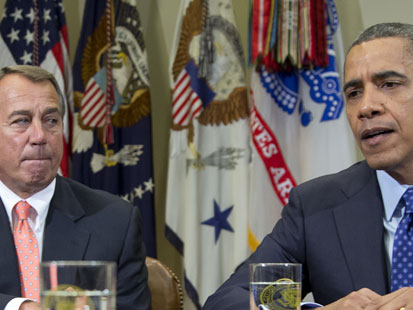CAIRO (Reuters) - Islamist crowds demonstrated in Cairo on Saturday in support of President Mohamed Mursi, who is racing through a constitution to try to defuse opposition fury over his newly expanded powers.
Many thousands assembled outside Cairo University, waving Egyptian flags and green Islamist emblems to show their backing for the president and the constitution he is promoting.
Mursi was expected later in the day to set a date for a referendum on the constitution hastily approved by an Islamist-dominated drafting assembly on Friday after a 19-hour session.
Mohamed Ibrahim, a hardline Salafi Islamist scholar and a member of the constituent assembly, said secular-minded Egyptians had been in a losing battle from the start.
"They will be sure of complete popular defeat today in a mass Egyptian protest that says 'no to the conspiratorial minority, no to destructive directions and yes for stability and sharia (Islamic law)'," he told Reuters.
Demonstrators, many of them bused in from the countryside, held pro-constitution banners. Some read "Islam is coming", "Yes to stability" and "No to corruption".
Tens of thousands of Egyptians had protested against Mursi on Friday and rival demonstrators threw stones after dark in Alexandria and the Nile Delta town of Al-Mahalla Al-Kobra.
"The people want to bring down the regime," they chanted in Cairo's Tahrir Square, echoing the slogan that rang out there less than two years ago and brought down Hosni Mubarak.
Mursi plunged Egypt into a new crisis last week when he gave himself extensive powers and put his decisions beyond judicial challenge, saying this was a temporary measure to speed Egypt's democratic transition until the new constitution is in place.
His assertion of authority in a decree issued on November 22, a day after he won world praise for brokering a Gaza truce between Israel and the Palestinian Islamist Hamas movement, dismayed his opponents and widened divisions among Egypt's 83 million people.
Two people have been killed and hundreds wounded in protests by disparate opposition forces drawn together and re-energized by a decree they see as a dictatorial power grab.
Mursi has alienated many of the judges who must supervise the referendum. His decree nullified the ability of the courts, many of them staffed by Mubarak-era appointees, to strike down his measures, although says he respects judicial independence.
A source at the presidency said Mursi might rely on the minority of judges who support him to supervise the referendum.
Mursi, once a senior Muslim Brotherhood figure, has put his liberal, leftist, Christian and other opponents in a bind. If they boycott the referendum, the constitution would pass anyway.
If they secured a "no" vote to defeat the draft, the president could retain the powers he has unilaterally assumed.
And Egypt's quest to replace the basic law that underpinned Mubarak's 30 years of army-backed one-man rule would also return to square one, creating more uncertainty in a nation in dire economic straits and seeking a $4.8 billion loan from the IMF.
"NO PLACE FOR DICTATORSHIP"
Mursi's well-organized Muslim Brotherhood and its ultra-orthodox Salafi allies, however, are convinced they can win the referendum by mobilizing their own supporters and the millions of Egyptians weary of political turmoil and disruption.
"There is no place for dictatorship," the president said on Thursday while the constituent assembly was still voting on a constitution which Islamists say enshrines Egypt's new freedoms.
Human rights groups have voiced misgivings, especially about articles related to women's rights and freedom of speech.
The text limits the president to two four-year terms, requires him to secure parliamentary approval for his choice of prime minister, and introduces a degree of civilian oversight over the military - though not enough for critics.
The draft constitution also contains vague, Islamist-flavored language that its opponents say could be used to whittle away human rights and stifle criticism.
For example, it forbids blasphemy and "insults to any person", does not explicitly uphold women's rights and demands respect for "religion, traditions and family values".
The draft injects new Islamic references into Egypt's system of government but retains the previous constitution's reference to "the principles of sharia" as the main source of legislation.
"We fundamentally reject the referendum and constituent assembly because the assembly does not represent all sections of society," said Sayed el-Erian, 43, a protester in Tahrir and member of a party set up by opposition figure Mohamed ElBaradei.
Several independent newspapers said they would not publish on Tuesday in protest. One of the papers also said three private satellite channels would halt broadcasts on Wednesday.
Egypt cannot hold a new parliamentary election until a new constitution is passed. The country has been without an elected legislature since a court ordered the dissolution of the Islamist-dominated lower house in June.
(Additional reporting by Marwa Awad; Editing by Louise Ireland)










